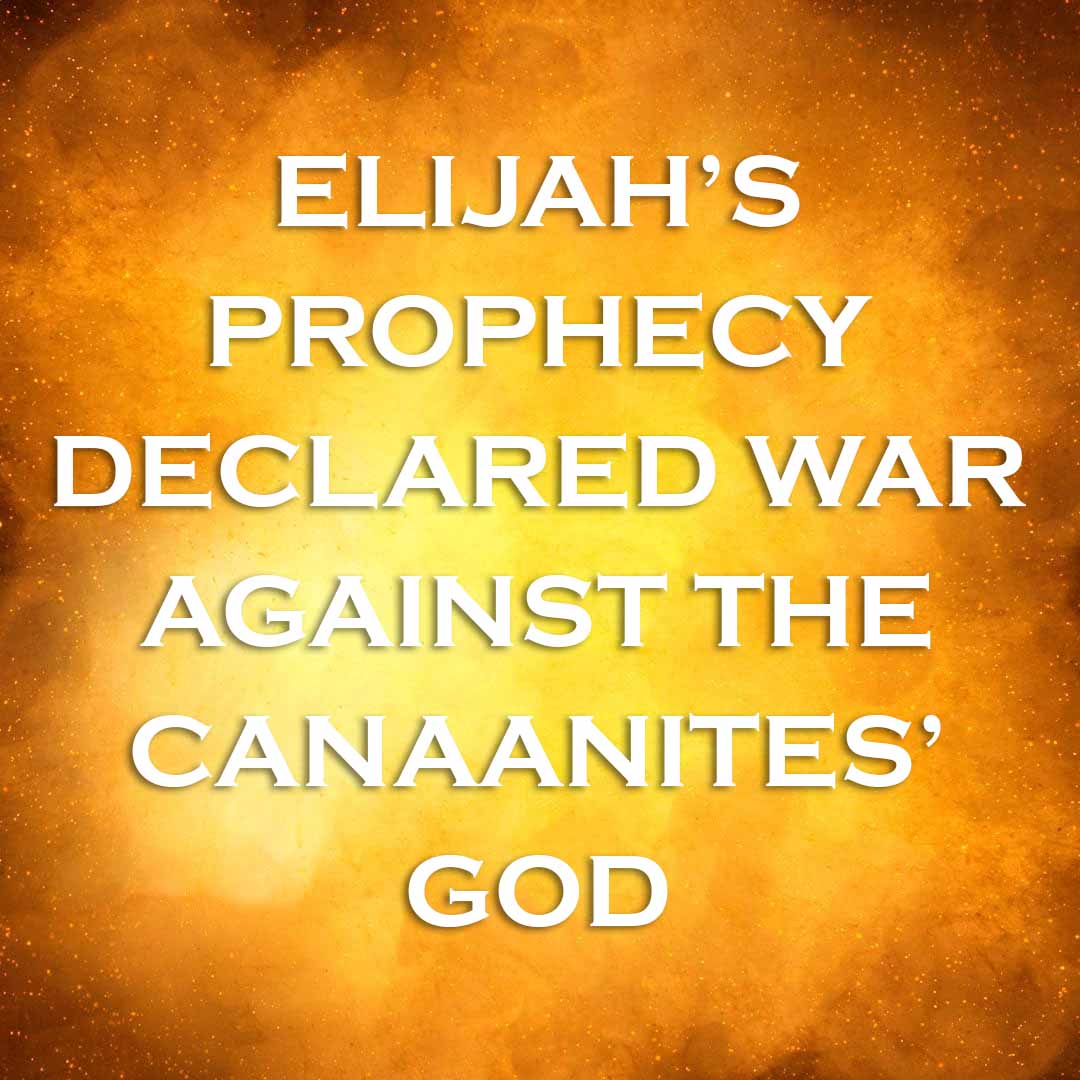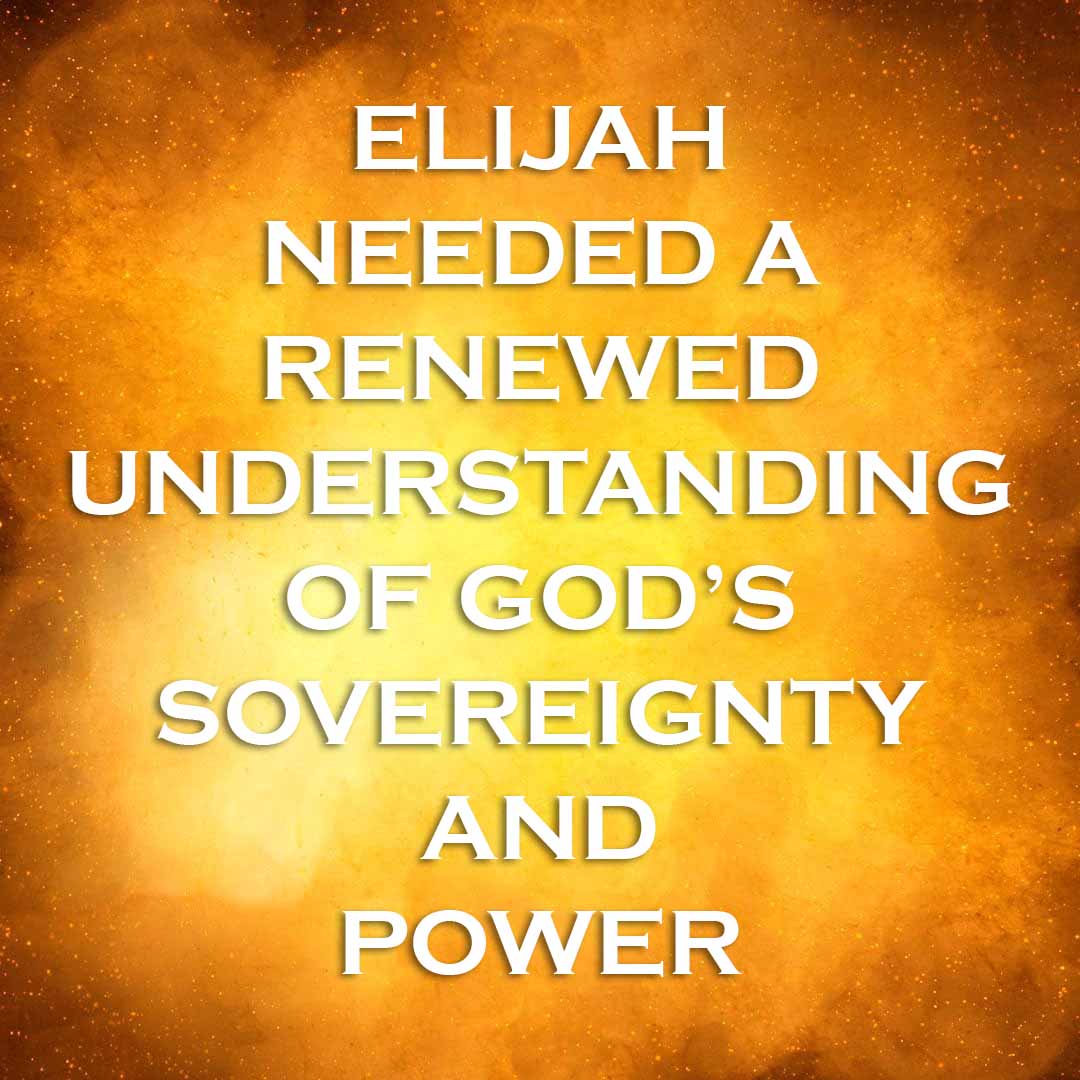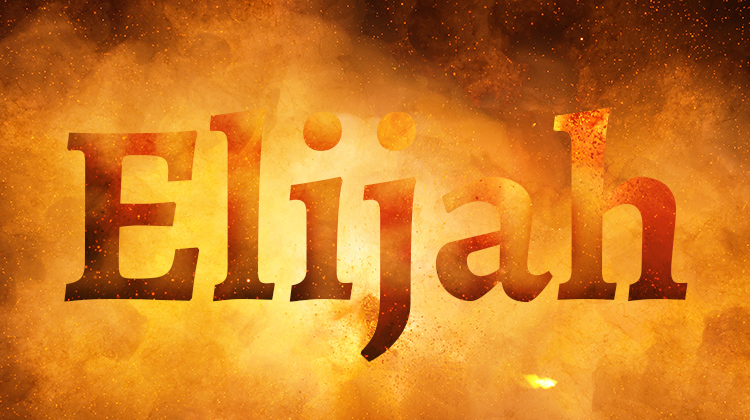The Bible says, "Elijah was a man with a nature like ours" (James 5:17); it also says he confronted idolatry, performed miracles, spoke God's judgment, and changed his world. This may seem like a tall order, but today's believers have a similar opportunity. Just as God spoke to Elijah in the Bible for the benefit of many, His Spirit of truth resides in us so that we may proclaim the Good News (2 Corinthians 4:1-7). God can use anything in this world to share His message, but He chooses to use ordinary people.
Read:
Elijah’s Fiery Faith
Elijah’s Preparation
Why Was Baal Worship Happening in Israel?
Elijah's Mountaintop Miracle
Why Would Elijah Ask God for Fire During a Drought?
Elijah's Escape From Jezebel
Elijah’s Crisis of Faith
Elijah’s Unanswered Prayer
4 Partial Truths Led to Elijah's Discouragement
Elijah’s New Assignment
Elijah’s Spiritual Legacy
Watch:
The Life of Elijah: Someone Like You (30:25)
God Protected Elijah by Hiding Him (1:33)
Elijah's Fiery Faith
Alexander Whyte described Elijah as a man who was always in a passion about something, whether it manifested as anger against Ahab and Jezebel, fury against idolatry, contempt for the priests of Baal, or prayer for his people, or a passion for the glory of God. And, God says, he was a man of like passions to our own.1
You might know Elijah as the prophet who called down fire on Mount Carmel and left earth in a chariot of fire, but he also had a fire in his belly. His passion for God's glory and Israel's repentance prompted a showdown with King Ahab and the prophets of Baal that was the boldest confrontation by any prophet since Moses challenged Egypt's pharaoh. It started when Elijah proclaimed a devastating drought (1 Kings 17:1). In Israel's agricultural economy, this meant famine and even death. For the Canaanites who believed Baal controlled the rain, Elijah's prophecy declared war against their god.
If that weren't enough, Elijah's prophecy invoked God's promise recorded in Leviticus 26: "If you walk in My statutes and keep My commandments, and perform them, then I will give you rain in its season" (verses 3-4). Israel still bore God's name, but the nation had forgotten the God of the covenant and credited idols for its prosperity. As a result, God withdrew His blessing. The drought was the first step toward setting the record straight.

In Revelation, Jesus rebuked a church for being lukewarm. He said the Laodicean church made Him sick because they were "neither cold nor hot" (Revelation 3:15-16). To first-century readers, hot and cold were measures of vitality and usefulness. The hot springs at Hierapolis were effective for healing and restoration, while the cold water at Colossae quenched people's thirst. However, lukewarm water was distasteful and unsatisfying, much like the faith of Ahab and the Israelites.
Lukewarm faith does not fool Almighty God. Only those who follow Him with intense passion will receive spiritual blessings and meaningful assignments.
Elijah's Preparation
God knew a rebellious king like Ahab would not take Elijah's challenge lying down. So, after Elijah predicted the drought, the Lord sent him into hiding for three years. During this time, God appointed the Brook Cherith and the city of Zarephath to be his hiding places.
Seclusion.
Facing an enemy often teaches us to trust God's power rather than our own, but Elijah's hiding was not wrong. God told him to hide! (1 Kings 17:2-3) Hiding with God is obedient; hiding from God is rebellious. On three different occasions, the psalmist referred to God's protective hiding:
- "Hide me under the shadow of Your wings" (Psalm 17:8).
- "You shall hide [those who fear and trust You] in the secret place of Your presence from the plots of man; You shall keep them secretly in a pavilion from the strife of tongues" (Psalm 31:20).
- "You are my hiding place; You shall preserve me from trouble; You shall surround me with songs of deliverance" (Psalm 32:7).
There are times to be courageous, and there are times of preparation. Discerning the difference requires sensitivity to God's leading. Adam and Jonah attempted the impossible task of hiding from God (Genesis 3:10; Jonah 1:3). For Elijah, hiding was God's way of preparing him. It allowed him to receive God's guidance and experience His provision.
When God calls someone to ministry, He often secludes them for a while. Jesus said, "Come to Me, all you who labor and are heavy laden, and I will give you rest" (Matthew 11:28). The Lord loves to hide His people alone so that He can have their undivided attention. This time prepared Elijah for future service by helping him to grow in faith and patience.
Submission.
Elijah's protection depended on him surrendering to God's leading. He had to be in the right place, at the right time. If Elijah had fled to the wrong place, the ravens would not have brought him food. When God sent Elijah to Zarephath later, he wouldn't have found the kind widow if he hadn't followed God's instructions.
Traveling from the Brook Cherith to Zarephath required careful obedience. Zarephath lay one hundred miles northwest of the Brook Cherith in a land crawling with Jezebel's assassins. In biblical Hebrew, the word Zarephath means "smelting pot," which describes Elijah's journey there. Smelting is a metallurgy process that melts down ore to split a base metal from impurities. God refined Elijah by separating him from Israel and sending him to Zarephath.

Even as a prophet, Elijah needed a renewed understanding of God's sovereignty and power. His survival in the land of Sidon depended on his obedience. The same principle applies today: God meets our needs when we are in His will.
Why Was Baal Worship Happening in Israel?
The road to Zarephath was treacherous, and the city was no better. It was the very place where Baal worship began! Don't miss this—God led Elijah to hide in the hometown of the idol he sought to destroy.
The worship of Baal and Asherah continued in this part of Israel because some of God's people had failed to drive out the Canaanites long ago (Judges 1:31-32). Their failure to follow God's instructions resulted in the incomplete conquest of the Promised Land, the incomplete eradication of Baal worship, and the incomplete obedience of future generations of God's people. Partial submission to God's will is never enough.
Disobeying God has unpredictable and sometimes disastrous results. In Matthew 7:26, Jesus said, "Everyone who hears these sayings of Mine, and does not do them, will be like a foolish man who built his house on the sand." No matter how unfamiliar our path may be, we can trust the One who will never leave us or forsake us (Deuteronomy 31:8). Spiritual valleys lead to higher places for those who stay close to the Lord.
Elijah's Mountaintop Miracle
Elijah's three-year period of hiding ended with a spectacular showdown against Jezebel's prophets on top of Mount Carmel. After calling together the people of Israel and the prophets of Baal, he declared,
How long will you falter between two opinions? If the Lord is God, follow Him; but if Baal, follow him…. I alone am left a prophet of the Lord; but Baal's prophets are four hundred and fifty men. Therefore let them give us two bulls; and let them choose one bull for themselves, cut it in pieces, and lay it on the wood, but put no fire under it; and I will prepare the other bull, and lay it on the wood, but put no fire under it. Then you call on the name of your gods, and I will call on the name of the Lord; and the God who answers by fire, He is God (1 Kings 18:21-24).
Whenever it rains in Palestine, it rains first at Mount Carmel. The mountain is high enough into the clouds that the moisture collection causes rain to drop on the mountain before it falls anywhere else. And at that time, the peak separated Israel (the land of God) from Phoenicia (the land of Baal). Mount Carmel was the ideal location for a contest between Israel's God and Canaan's gods.
While the location made sense, it is strange that Elijah would ask God for fire to fall after three years of drought. However, Elijah knew fire could accomplish what water could not: a radical transformation in the hearts of God's chosen people. Before rain could pour down in mercy, a holy fire had to descend in wrath. Sometimes God sends the last thing we think we need.

Why Would Elijah Ask God for Fire During a Drought?
Witnessing God's power through something as unwelcome as fire allowed Israel to respond to God's holiness outside of His blessing. Had He immediately supplied rain, which they desperately needed, their response might have been self-serving. The fire also reminded the Israelites of the stories handed down by prior generations that connected God's mighty acts with blazing fire. They knew:
- God spoke to Moses through a burning bush (Exodus 3:2).
- The Lord guided Israel by night in a pillar of fire as they traveled to the Promised Land (Exodus 13:21).
- God descended upon Mount Sinai in a fire when He called Moses to the mountaintop before giving the Ten Commandments (Exodus 19:18).
- The fire of God consumed the burnt offering at the Tent of Meeting when His glory appeared (Leviticus 9:23-24).
- Heavenly fire exacted God's judgment against Sodom and Gomorrah (Genesis 19:24), Egypt (Exodus 9:24), Israel's golden calf (Exodus 32:20), Nadab and Abihu's strange fire (Leviticus 10:1), Israel's complaints at Taberah (Numbers 11:1-3), Korah's insubordination (Numbers 16:35), and Jericho's destruction (Joshua 6:24).
The writer of Hebrews cautions us to "serve God acceptably with reverence and godly fear. For our God is a consuming fire" (Hebrews 12:28-29). We live in an age of grace, but that does not give us the freedom to ignore God's holiness.
Elijah's Escape From Jezebel
When believers stand tall for the Lord, Satan attacks from every side, and so it was for Elijah. He knew Ahab saw him as a necessary tool to bring back the rain while the drought lasted. Once the rain returned, however, Ahab no longer needed him. Fear replaced Elijah's faith when he took his eyes off the Lord and directed them to his circumstances.
After playing a leading role in one of the most spectacular displays of God's power in human history, Elijah hid from Ahab's wife, Queen Jezebel, when she threatened to kill him. And unlike his flight to the Brook Cherith, there is no indication in Scripture that he consulted God before hiding. His fear became a snare (Proverbs 29:25).
With his frustration tank full and his emotional gauge on empty, Elijah fled to Beersheba and then the wilderness (1 King 18:46; 19:3). He outran a chariot on the seventeen-mile trek from Mt. Carmel to Jezreel. Then he ran more than 75 miles to Beersheba. Fatigue makes cowards of us all, and Elijah's exhaustion overwhelmed him.
Elijah's Crisis of Faith
Elijah lost faith when his people were on the threshold of revival. Feelings of failure kept him from claiming victory. Had he failed? Not exactly. According to John Maxwell, "To accept failure as final is to finally be a failure." So, failure is a state of mind.

Elijah's story reminds me of the apostle Peter. At Jesus' command, Peter stepped out of a boat to walk on a stormy sea. But the Bible says, "When he [Peter] saw that the wind was boisterous, he was afraid; and beginning to sink he cried out, saying, 'Lord, save me!'" (Matthew 14:30) Like Elijah, Peter faltered after a magnificent display of God's power, proving that God's "power works best in weakness" (2 Corinthians 12:9, NLT). We do not need extraordinary faith; we only need to place our weak faith in a supernatural God.
When we're in the process of long-term success, the devil tells us we have failed. He uses discouragement to neutralize us and accomplish his purpose in our life. We cannot give him this kind of foothold. God did not give up on Elijah, and He will not give up on you and me.
You Might Also Enjoy:
• Will Elijah Return During the Tribulation?
• 4 Lessons From Elijah and the Prophets of Baal
• When You Feel Discouraged, Do This Immediately
Elijah's Unanswered Prayer
Elijah sat under a broom tree and prayed his fourth prayer recorded in Scripture when he finally finished running. He asked God to take his life. Why? "I am no better than my fathers," he moaned (1 Kings 19:4). After three years of preparing for Mount Carmel, Elijah wasn't ready for what came next.
Elijah did not die that day. In fact, he never died! Years later, a chariot of fire took him to heaven in a whirlwind. God knew Elijah's emotions were out of touch with reality, and he needed rest. Aren't you glad God sifts our prayers and interprets them with His perfect wisdom? And in the process of filtering, He knows better than to answer some of our pleas.
4 Partial Truths Led to Elijah's Discouragement
Anything other than the total truth is an untruth, and discouragement selects its own facts. Elijah focused on things that made his situation seem worse, which allowed the enemy to sow seeds of doubt. First Kings 19:14 outlines four half-truths Elijah believed.
- He was zealous for the Lord (until he panicked under Queen Jezebel's persecution).
- The Israelites had forsaken God's covenant (until the victory on Mount Carmel).
- He was the only prophet left (except for Obadiah and his one hundred hideaways).
- He was up against the world (or, more like, Jezebel). He suggested the whole nation was trying to kill him when, in fact, it was only the queen. "By turning a queen into an entire kingdom, the prophet was magnifying his troubles, nursing his sense of self-pity."2
Have you ever considered that valleys find their definition in the high places surrounding them? In much the same way, trials often accompany our triumphs. But we can view the valley's depth as a promise of the height of blessing to come. Anticipating tough times helps us to be armed and ready.
Although Charles Haddon Spurgeon was one of the greatest preachers in history, he struggled with valleys of depression in his life and ministry. He explained, "Depression comes over me whenever the Lord is preparing a larger blessing for my ministry; the cloud is black before it breaks, and overshadows before it yields its deluge of mercy. Depression has now become to me as a prophet in rough clothing." 3 Spurgeon could not avoid the doldrums, but He trusted God for better times ahead.
When we get discouraged or depressed, sometimes we need to be physically reinvigorated or need a good counselor. Other times, we need to be alone with our Bibles and God. We need to shut out the distractions while inviting God into our mess. Discouragement presents an opportunity to draw near Him, lean into His counsel, and search our hearts.
Elijah's New Assignment
Through all Elijah's bouts with discouragement, God never failed him. And He didn't thunder into Elijah's life with booming condemnation. Instead, the Lord sent angels to minister to him. Then, He whispered a new assignment. God instructed Elijah to anoint three men who would complete the job He had given to Elijah. It is as if God said, "It's all right, Elijah. I know you're tired. I'll get somebody else to finish up."
For as long as we are on this earth, God will have work for us to do. But God's new plan for Elijah confirms that we are not indispensable. If we don't complete our assignments, we will miss the rewards of obedience, but God will call someone else. Although Elijah continued to serve the Lord by prophesying and training Elisha (1 Kings 19:21), the other three men completed the work of removing Baal worship from Israel.

Discerning God's still, small voice in our noisy world takes effort. When someone whispers, we must lean into it if we want to hear. It might mean turning off some things and turning down others. When was the last time you leaned in to hear God's whisper?
Elijah's Spiritual Legacy
The prophet Elijah accomplished extraordinary things through God's quiet, behind-the-scenes activity in his life. During one of the darkest hours of his nation's history, Elijah prayed earnestly (James 5:16-18), and God prepared him to stand on the mountain with his hands held up high in victory. Long before he was in public, Elijah was privately before God.
Why Did Elijah Need to Pray for Rain?
John Wesley said that God does nothing but in answer to prayer. God dignifies us by letting us participate in the next thing on His agenda. He sometimes stirs us to pray; we sometimes feel it is our idea and begin pleading with Him to work.... When God reveals something prophetically, He is bringing into the present moment what has not yet transpired.4Elijah succumbed to fear at times, but he also demonstrated courage. When God delayed sending rain, Elijah continued to pray. After his seventh prayer, a small cloud appeared in the distance. It was all the encouragement he needed. Elijah instructed Ahab to prepare his chariot and leave before the rain prevented him (1 Kings 18:44). Because Elijah remained close to God in prayer, he heard the sound of rain before it was visible or even a cloud in the sky.
Another man might have swelled with pride, but Elijah gave all credit to the Lord. His most public miracle, calling down heaven's fire on that mountain, caused people to praise God, not him. Scripture says, "When all the people saw it, they fell on their faces; and they said, 'The Lord, He is God! The Lord, He is God!'" (1 Kings 18:39) Throughout his ministry, Elijah honored God first. We can live in the spirit and power of this prophet if we follow the humble example of Elijah in the Bible.
Sources:
1Quoted in J. Oswald Sanders, Bible Men of the Faith (Chicago: Moody Publishers, 1970), 127.
2Philip Graham Ryken, 1 Kings (Phillipsburg: P & R Publishing, 2011), Kindle edition.
3C.H. Spurgeon, “The Minister’s Fainting Fits” from Lectures to My Students (Grand Rapids: Zondervan Publishing House, 1970), 155-156.
4R.T. Kendall, These Are the Days of Elijah (Grand Rapids: Baker Publishing Group, 2013), 105.
